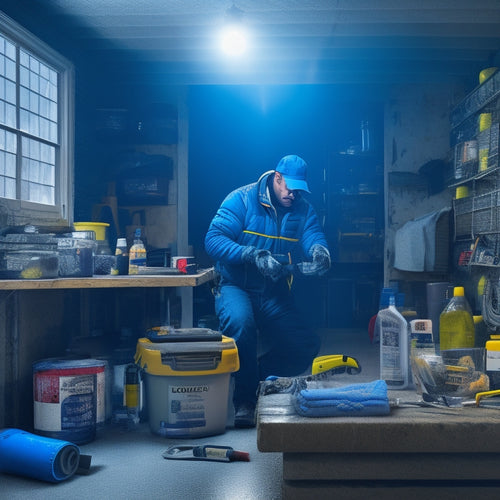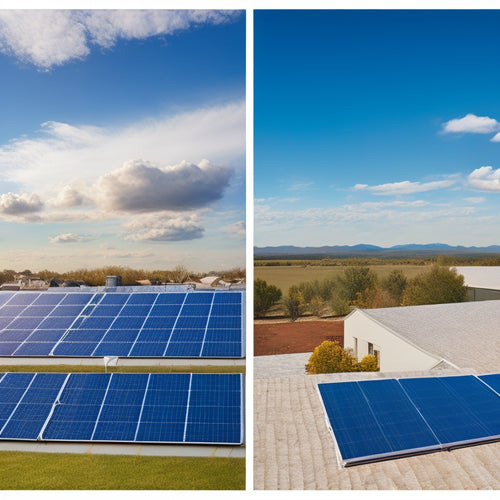
Boost Energy Efficiency With These 3 Expert Tips
Share
You can greatly enhance energy efficiency by implementing a few strategic changes to your daily habits and home setup. First, conduct an energy audit to identify areas of inefficiency and replace old appliances with energy-efficient ones. Next, consider investing in smart meters and solar panels to optimize your energy consumption. Finally, adjust your daily habits, such as turning off lights when not in use, and manage your thermostat settings for efficient heating and cooling. By implementing these tips, you'll be on your way to reducing your energy bills and carbon footprint - and there's even more to explore to maximize your energy efficiency.
Key Takeaways
• Conduct an energy audit to identify areas of inefficiency and opportunities for improvement in your energy consumption.
• Replace old appliances with energy-efficient alternatives, such as LED bulbs, to reduce energy waste.
• Adjust daily habits, like turning off lights when not in use, to make a significant impact on energy consumption.
• Invest in smart plugs to remotely control power supply and eliminate standby power consumption.
• Consider installing solar panels and energy storage systems to harness renewable energy and reduce reliance on non-renewable sources.
Optimize Your Energy Consumption
Identify areas of inefficiency in your daily habits and appliances to reduce unnecessary energy waste by implementing simple changes in your daily routine. Start by conducting an energy audit to pinpoint areas of energy inefficiency in your home. This will help you identify which appliances and habits are consuming the most energy.
Consider installing Smart Meters, which can provide real-time energy usage data, helping you stay on top of your energy consumption.
Next, take a closer look at your appliances. Are they energy-efficient? Consider replacing old appliances with energy-efficient ones, such as LED bulbs and Energy Star-rated appliances.
You can also adjust your daily habits to reduce energy waste. For instance, turn off lights and electronics when not in use, and adjust your thermostat to use less energy for heating and cooling.
Harness Solar Power Effectively
By integrating solar panels into your energy strategy, you can greatly reduce your reliance on non-renewable energy sources and lower your carbon footprint. This sustainable approach not only benefits the environment but also saves you money on energy bills.
To harness solar power effectively, consider the following:
-
Assess your energy needs: Evaluate your energy consumption patterns to determine the suitable capacity of solar panels required.
-
Choose the right panel type: Select solar panels with high efficiency rates and durability to maximize energy production.
-
Optimize energy storage: Invest in energy storage systems to store excess energy generated during the day for use during the night or on cloudy days.
- Monitor and adjust: Regularly monitor your solar panel performance and adapt your energy strategy as needed to guarantee maximum efficiency.
Streamline Your Energy Usage
To maximize energy efficiency, you need to pinpoint areas of wasteful energy consumption in your daily routine and eliminate them. Start by conducting an energy audit to identify energy-hungry appliances and devices. This will help you understand where energy is being wasted and take corrective action.
For instance, you might find that your TV and computer continue to draw power even when turned off, a phenomenon known as 'vampire power' or 'standby power.' To tackle this issue, consider investing in smart plugs that can detect when a device is in standby mode and cut power supply accordingly. These smart plugs can be controlled remotely, allowing you to turn off devices even when you're not at home.
Frequently Asked Questions
Can Energy-Efficient Appliances Save Me Money in the Long Run?
As you likely suspect, energy-efficient appliances can indeed save you money in the long run, thanks to their superior energy ratings, which translate to lower utility bills, and their longer appliance lifespan, reducing replacement costs.
How Often Should I Inspect My Home's Insulation for Damage?
You should inspect your home's insulation for damage every 3-5 years, paying close attention to the attic inspection, to guarantee peak energy efficiency and prevent heat loss, saving you money in the long run.
Are Energy-Efficient Windows Worth the High Upfront Cost?
When considering energy-efficient windows, you'll weigh the high upfront cost against long-term savings. Look for durable window frames and explore glass options like low-E coatings, double- or triple-paned glass, and gas fills to maximize energy efficiency.
Can I Claim Tax Credits for Energy-Efficient Home Upgrades?
You can claim tax credits for energy-efficient home upgrades, leveraging tax incentives to offset costs. Guarantee your upgrades meet green certification standards, like ENERGY STAR, to maximize your credits and contribute to a sustainable community.
Do Energy-Efficient Light Bulbs Really Make a Significant Difference?
You'll be surprised by the impact of energy-efficient light bulbs, which use much less wattage while maintaining similar lumens output, resulting in a noticeable reduction in your energy consumption and costs.
Related Posts
-

Waterproofing Solar Panels for Vehicles: A Step-by-Step Guide
When waterproofing solar panels for your vehicle, start by evaluating your energy requirements and selecting the righ...
-

Charging Station Incentives: Why So Many Are Free
You're likely to stumble upon free or low-cost charging stations due to a convergence of incentives. Government rebat...
-

Tracking Solar Panels Vs Fixed Panels Cost Savings
When considering solar panel options, you'll want to weigh the cost savings of tracking solar panels versus fixed pan...


